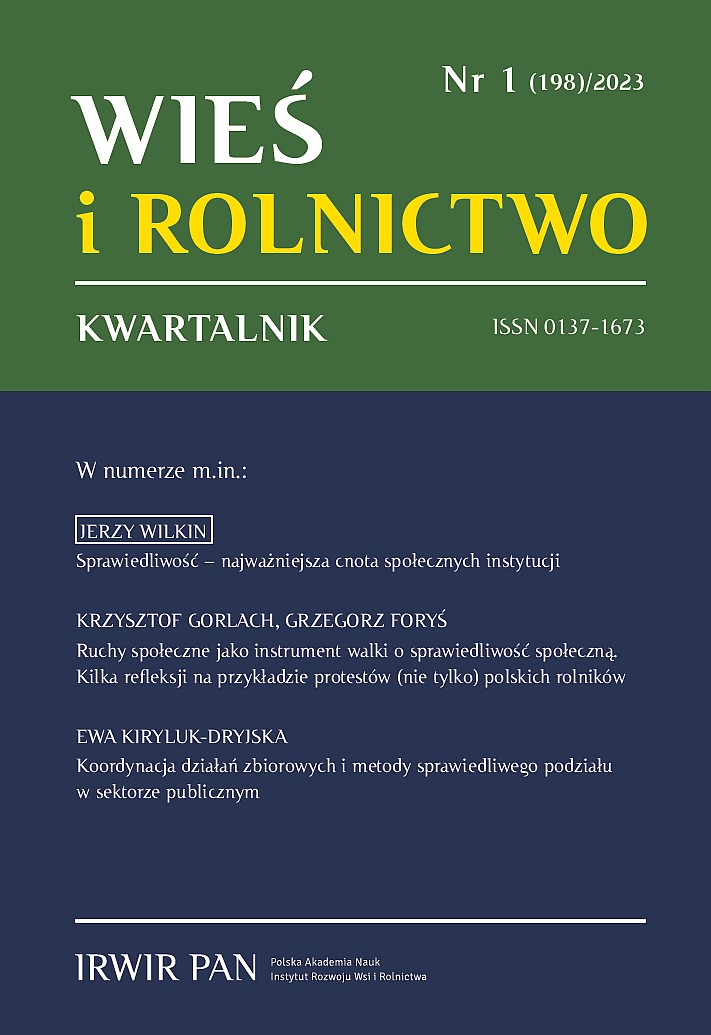On (Un)just Economic Inequalities
DOI:
https://doi.org/10.53098/wir012023/03Keywords:
justice, freedom, economic inequalities, meritocracyAbstract
Some economists are committed to the idea that we as a society are not responsible for the economic inequalities that result from countless independent market decisions made by autonomous self-interested individuals. Economists are also attached to the concept of the market as a mechanism that rewards the talented and hard-working. As the study shows, these two views on the effects of our market activity raise substantial ethical objections. A society with a legislative will is responsible for inequalities. The concept of rewarding talent and effort leads to unjust economic inequality. The myth of meritocracy, which functions in society, brings with it the erosion of community, the degradation of the common good, and the sense of responsibility for others, particularly for losers, while reinforcing economic inequalities.
References
Berg A., Ostry J.D., Tsangarides C.G., Yakhshilikov Y. (2018). Redistribution, inequality, and growth: New evidence. Journal of Economic Growth, 23 (3), 259–305. DOI: https://doi.org/10.1007/s10887-017-9150-2
Boese V.A., Alizada N., Lundstedt M., Morrison K., Natsika N., Sato Y., Tai H., Lindberg S.I. (2022). Autocratization Changing Nature? Democracy Report 2022. University of Gothenburg: Varieties of Democracy Institute (V-Dem). DOI: https://doi.org/10.2139/ssrn.4052548
Brzeziński M. (2017). Czy Polska jest krajem dużych nierówności ekonomicznych? IBS Policy Paper, 1.
Chancel L., Piketty T., Saez E., Zucman G. (2022). World inequality report 2022. World Inequality Lab. http://wir2022.wid.world (dostęp: 15.11.2022). DOI: https://doi.org/10.4159/9780674276598
Frank R.H. (2018). Sukces i szczęście. Dobry los a mit merytokracji. Warszawa: Wydawnictwo Naukowe PWN.
Gray J. (2001). Dwie twarze liberalizmu. Warszawa: Fundacja Aletheia.
Hayek F.A. (2006). Konstytucja wolności. Warszawa: Wydawnictwo Naukowe PWN.
Hayek F.A. (1993). Law, Legislation and Liberty: A New Statement of the Liberal Principles of Justice and Political Economy. Volume 2: The Mirage of Social Justice. London: Routledge.
Hayek F.A. (1978). The atavism of social justice. W: F.A. Hayek. New Studies in Philosophy, Politics, Economics and the History of Ideas (s. 57–68). London and Henley: Routledge & Kegan Paul.
Kelly P. (2007). Liberalizm. Warszawa: Wydawnictwo Sic!
Komornicki T. (2019). Polska sprawiedliwa komunikacyjnie. Warszawa: Fundacja im. Stefana Batorego.
OECD [Organization for Economic Cooperation and Development], EU [European Union]
(2022). Health at a Glance: Europe 2022: State of Health in the EU Cycle. Paris: OECD Publishing.
OECD (2021). Does Inequality Matter? How People Perceive Economic Disparities and Social Mobility. Paris: OECD Publishing. DOI: https://doi.org/10.1787/3023ed40-en
OECD (2015). In It Together: Why Less Inequality Benefits All. Paris: OECD Publishin.
OECD (2011). Divided We Stand: Why Inequality Keeps Rising. Paris: OECD Publishing. DOI: https://doi.org/10.1787/9789264119536-en
Piketty T. (2015). Kapitał w XXI wieku. Warszawa: Wydawnictwo Krytyki Politycznej.
Rawls J. (1998). Liberalizm polityczny. Warszawa: Wydawnictwo Naukowe PWN.
Rawls J. (1994). Teoria sprawiedliwości. Warszawa: Wydawnictwo Naukowe PWN.
Rosner A. (2022). Kilka uwag o pojęciu „sprawiedliwość”. Wieś i Rolnictwo, 4 (197), 11–21. DOI: https://doi.org/10.53098/wir042022/01a
Sandel M.J. (2020). Tyrania merytokracji. Co się stało z dobrem wspólnym? Warszawa: Wydawnictwo Naukowe PWN.
Sawulski J. (2019). Kogo obciążają podatki w Polsce? IBS Policy Paper, 1.
Sen A. (2009). The Idea of Justice, Cambridge, Mass.: Harvard University Press.
UNICEF (2018). Niesprawiedliwy start: nierówności edukacyjne wśród dzieci w krajach wysokorozwiniętych. Innocenti Report Card 15. Florencja: UNICEF Office of Research – Innocenti.











